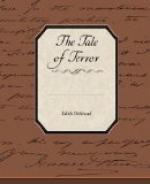That the readers of fiction in the last decade of the eighteenth century eagerly desired the mysterious and the terrible, Mrs. Radcliffe’s widespread popularity proved unmistakably. To satisfy this craving, Godwin, who was ever on the alert to discover a subject which promised swift and adequate financial return, turned to novel-writing, and supplied a tale of mystery, The Adventures of Caleb Williams (1794), and a supernatural, historical romance, St. Leon (1799). As he was a political philosopher by nature and a novelist only by profession, he artfully inveigled into his romances the theories he wished to promote. The second title of Caleb Williams is significant. Things As They Are to Godwin’s mind was synonymous with “things as they ought not to be.” He frankly asserts: “Caleb Williams was the offspring of that temper of mind in which the composition of my Political Justice left me"[75]—a guileless confession that may well have deterred many readers who recoil shuddering from political treatises decked out in the guise of fiction. But alarm is needless; for, although Caleb Williams attempts to reveal the oppressions that a poor man may endure under existing conditions, and the perversion of the character of an aristocrat through the “poison of chivalry,” the story may be enjoyed for its own sake. We can read it, if we so desire, purely for the excitement of the plot, and quietly ignore the underlying theories, just as it is possible to enjoy Spenser’s sensuous imagery without troubling about his allegorical meaning. The secret of Godwin’s power seems to be that he himself was so completely fascinated by the intricate structure of his story that he succeeds in absorbing the attention of his readers. He bestowed infinite pains on the composition of Caleb Williams, and conceived the lofty hope that it “would constitute an epoch in the mind of every reader."[76] A friend to whom he submitted two-thirds of his manuscript advised him to throw it into the fire and so safeguard his reputation. The result of this criticism on a character less determined or less phlegmatic than Godwin’s would have been a violent reaction from hope to despair. But Godwin, who seems to have been independent of external stimulus, was not easily startled from his projects, and plodded steadily forward until his story was complete. He would have scorned not to execute what his mind had conceived. Godwin’s businesslike method of planning the story backwards has been adopted by Conan Doyle and other writers of the detective story. The deliberate, careful analysis of his mode of procedure, so characteristic of his mind and temper, is full of interest:




